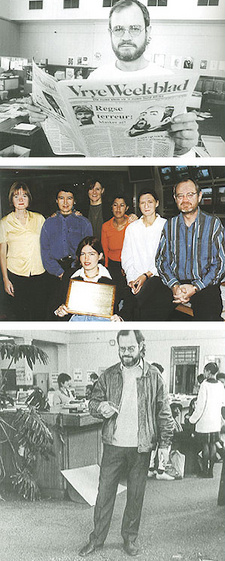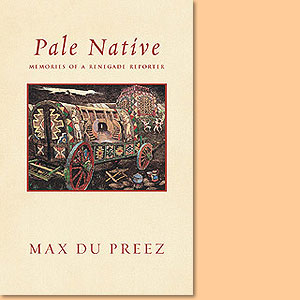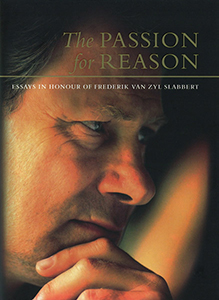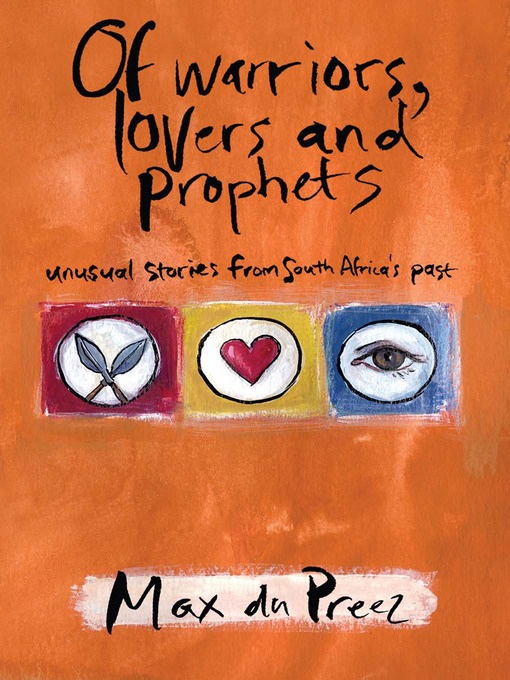Pale Native, by Max du Preez
Pale Native, Max du Preez, has one hell of a story to tell. "History is against you, my brother”: It was late in 2002. My professional options had become fewer and fewer, and my bank manager more and more agitated. Perhaps it was time for me to get a job after years of being an independent operator. An exciting job right up my alley was advertised, but I hesitated.
I had never, since starting to work as a journalist in 1973, applied for a job. I was always offered jobs, started my own projects or worked as a freelancer. But friends and colleagues encouraged me, and in the end I sent in my CV. The interview with the panel was interesting. I quickly realised I probably knew a lot more about my (and their) craft than they did. I had done this kind of job several times before with considerable success. But it quickly became clear to me that the interview was a charade.
What I'd feared was going to happen, was happening. I was not black. I could not even try to be black. My parents and their parents and grandparents were white-skinned. I could change my personality, my qualifications, my appearance - I could even have a sex change. But I could not change the colour of my skin, ever. I sat through the rest of the interview, mechanically answering their questions, but my mind was elsewhere: the New South Africa about which I'd dreamt so much, worked so hard to help achieve and was enjoying living in, was finally turning its back on me. Of course it wasn't the first indication I'd had that this was happening to me, but the situation had never been as simple and clear-cut as this. It wasn't a comfortable feeling. Early the next day, one of my interviewers, an old acquaintance who, ironically, had once unsuccessfully asked me for a job, phoned. 'You and I know you're ideal for this job, Max,' he began uncomfortably. I let him sweat a bit. 'But I'm sure you'll understand it is politically and strategically impossible to appoint a white person. We have to go black now.' And then my friend said the magic words that led me to writing this book: 'History is against you, my brother.'
History. My personal history: what has happened to me, who I have been, what I have said and done. My family's history through more than three centuries of living in Africa. My tribe's history: colonialism, struggle, apartheid, baasskap. My country's history: oppression, division, conflict, liberation. My continent's history, the history of my species on this planet. My-story. History is against me, my old comrade had said. That is quite a serious thing to say to someone. You're done, my brother, and there's nothing you can do about it - utterly inexorable, like some sort of super-universal karma. I remembered something that had puzzled me greatly when I was a child: the biblical declaration that the sins of the fathers would be visited on their sons for generations. As a youngster I wondered what kind of god would punish a boy for what his father and grandfather had done. Perhaps it was that god who had now turned history against me, who was making me pay for the sins of the fathers of my tribe over many generations.
It was during this time that I heard, for the first time in years, from an old colleague and partner in crime, who e-mailed me from Oxford. Why on earth did he leave paradise, I asked him. His e-mail replied, 'The Big Wheel of History had turned. That's all. I'm not crying. It was right that the wheel turned. You can't blame the wheel for the fact that it crushed me. As ek kyk no al die arme undignified poepholle wat probeer vasklou het, is ek biy ek hetfokofgekies [When I look at all the poor undignified arseholes who tried to cling on, I am glad I chose to fuck off].
He reminded me of the slogan I'd used when the newspaper I had founded and edited was eventually crushed and had to close: Ons fade nie, ons fokof [We don't fade away, we fuck off]. That was my credo; it was nice and simple, and I lived by it. And now that history has turned against me, am I going to fade or am I going to fuck off? Where would I go? Or am I going to be a poor undignified poephol trying to hang on? And what does that mean? The more important question lurking beneath all this was: Was there no role left for me, in the prime of my life, to play in my country because a black majority was in charge and I had a white skin? Is History, this thing that has now become almost personalised in my head, saying I don't belong in Africa? Or perhaps that I can stay, as long as I shut up and am a good, loyal subject? Am I, in the words of my country's president, 'a colonialist of a special kind'?
Have I become a bywoner, a tenant farmer, in the land I am so passionate about? My friend in Oxford and many other friends and former colleagues had chosen to leave the country. Only once before had this option been put before me: an offer of an academic post at a Dutch university. I fantasised for about five seconds about teaching nubile young Hollandse meide, and then said no. It wasn't even patriotism or a sense of duty or responsibility that prevented me from ever considering leaving South Africa. It was just unthinkable. If you transplant a fifty-year-old kameeldorn tree, it will wither and die. Its root system goes too deep to dig out. Just as I cannot change the colour of my skin, I cannot become an American, European or Australian. I would be an alien forever, like a polar bear in the Pretoria Zoo. My soul is African. My skin colour is the only European thing about me.
Yes, this 'history-is-against-you' thing really bugged me. Suddenly, I suffered a midlife crisis, an identity crisis and a nobody-loves-me-any-more crisis all at the same time. The next day I walked to the top of the mountain on my piece of land in the Eastern Free State and had a bottle of wine all on my own with my dog by my side. I peered over the Mautse Valley all the way to the misty blue Maluti Mountains in the distance. King Moshoeshoe's country. As a child my father had told me many fascinating stories about Moshesh, as he was known, the founder of the Basotho nation, who never lost a war. In my small world in the rural Free State, King Moshesh had undoubtedly been my biggest hero, perhaps like Superman had been for my son. In the cliffs around me was the spectacular art of the world's oldest people, the San, or Bushmen, who lived here for thousands of years. Only a handful of these remarkable naturalists survive today.
The valley below me was once, almost two centuries ago, strewn with the corpses of tens of thousands of people, the victims of a massive social and military upheaval involving the Zulu and Sotho peoples. Eight decades later, this was the theatre of war between the Boer and the Brit. The British, as part of their scorched earth policy, burned down most of the farms and homesteads around me. My paternal grandfather fought in that war in these parts as an officer of the Republic of the Orange Free State, and ended up a prisoner of war in Ceylon. He came back such a sick man that he died a few months before my father was born.
I, too, had almost died prematurely, at the foot of this very mountain. In 1989 a senior officer of the South African Defence Force lay waiting for me, his Russian assassination rifle trained on my front door, where I was expected to arrive at any moment. I was a traitor to my people: I had sided with the enemy, the black communists of the African National Congress (ANC). But something came up, and I only arrived two days later. He didn't wait. I only know about this because he confessed to me years later.
My mother died when I was an infant and I never knew much about her family. I do know that her great-uncle, Paul Kruger, spent some time in this region as a child of the Great Trek. Some forty years before Kruger became the president of the Zuid-Afrikaansche Republiek north of the Vaal River, around the 1840s, he was asked to negotiate a peace treaty with King Moshesh on behalf of the Orange Free State. He must have travelled right past this way, probably down the valley just below me, on his way from Pretoria to Thaba Bosiu, Moshesh's mountain stronghold in the foothills of the Malutis.
I own a yellowed, first-edition copy of his memoirs, called The Memoirs of Paul Kruger, Four times President of the South African Republic - Told by Himself, published by T Fisher Unwin in 1902. According to Kruger, he met the king on top of the mountain, where Moshesh rebuked him for believing his military successes were due to his own bravery. Rather, the king said, 'it was the dispensation of God'. Kruger wrote: 'Now, as Moshesh was at that very moment speaking of the dispensation of God and using pious words, I said to him: "But, if you are so devout, how do you come to have more than one wife?" Moshesh replied: "Yes, I have just about two hundred; but this is not half so many as Solomon had."
'To which I made answer: "Yes, but you surely know that, since Christ's time, and according to the New Testament, a man may have only one wife." Moshesh reflected for a moment and then said: "Well, what shall I tell you ... it is just nature."
In the evening, I sent for Moshesh again to come to me. Moshesh came, but this time dressed like an ordinary Kaffir, that is, not in European clothes. When he came in, I called him: "Why is Moshesh so long in coming? Can't he come when I send for him?"
'Moshesh answered: "I am Moshesh".'
Three words, but a full explanation. Yet I'm not sure my great-great-uncle understood it. Many decades later, other men like Moshoeshoe looked their white adversaries in the eye and said: 'I am Sobukwe.' 'I am Biko.' 'I am Mandela.' The Verwoerds, Vorsters and Bothas could not grasp that they were saying, 'I am an African. The soil under your feet has belonged to my people long before there was a Europe or an Asia or an America. I represent a civilisation as old as humanity.'
On 27 July 1987,1 was sitting in a small hall in Dakar, Senegal. A man, banned and in exile, walked to the microphone to introduce himself to a group of fifty or so nervous white people on a visit from South Africa. He gave a new version of 'I am Moshesh.' He said, 'I am Mbeki. I am an Afrikaner.' (Twelve years later, Thabo Mbeki was elected president of South Africa.)
African/Afrikaner. The first human being on record who described his own identity as someone from the African continent was a young white man in March 1707. Hendrik Biebouw and three of his friends had had too much to drink and were caught racing wildly on their horses through the streets of the tiny village of Stellenbosch. Landdrost [magistrate] Johannes Starrenberg hit the teenager with a cane and ordered him to leave. Biebouw shouted: 'I shall not leave, I am an Afrikaander, even if the magistrate beats me to death or puts me in jail.' Five years later, a Dutch colonial document referred to locally born burghers [citizens] as 'Afrikaner'.
Yet, as black South Africans became a more coherent group demanding political rights, the same people who first called themselves by the name of the African continent started identifying themselves as 'Europeans'. It said so on the segregated park benches and public toilets: 'Europeans Only'.
African/Afrikaner. I am both. I call myself after my continent twice. I wish I could otherwise. It is the reason I am in the predicament I am now. During the apartheid years, my fellow Afrikaners deeply resented me because I associated so strongly with the African part of me. Now, after our liberation, fellow Africans only want to see the Afrikaner side of me. I am a native of this land, but unlike most other natives, I am pale. The tongue of my heart and my soul is a tongue born in Africa and called after Africa, but after many decades of abuse it is now resented by many as the tongue of alien invaders.
Ja-nee, I thought, sitting on top of the mountain. Africa is not a place for sissies. I was born into a rough neighbourhood. It has no time for sulkers, little mercy for people who act as victims. Have I become one of those despicable, snivelling, so-called liberals who expressed their disdain at the crudities of apartheid but had no stomach for a robust, raw and energetic free South Africa? The energy that I feel gushing from the soil, my African soil, through my foot soles and into my spirit tells me who I am. The ancient mountains and valleys around me whisper to me that I am where I belong. Forces much greater than loud-mouthed politicians and my own fears and insecurities have placed me exactly here at this time. I am who I should be and where I should be.
My soul is not the soul of a bywoner. So it came that I snapped out of my malaise and decided to let my mind wander over my history, my country and my experiences as a journalist over thirty years. I had the great privilege of having been an eyewitness to one of the greatest human stories in modern history. That's all this book tries to be: the wanderings of a mind with a very short concentration span, in a small and personal way trying to make sense of big questions around history, fate and identity.
Skyways (Mandi Smallhorne): "Max du Preez's autobiography, Pale Native is wonderful reading - eye-opening and at times very amusing, thought-provoking and full of anecdotes from the inside of the great events which have taken place over the last few decades; it is an important contribution to the historical record."
This is an extract from the book: Pale Native, by Max du Preez
Book title: Pale Native
Author: Max du Preez
Zebra Press
Cape Town, South Africa 2004
ISBN 1868729133
Softcover, 15x23 cm, 304 pages, some bw-photos
du Preez, Max im Namibiana-Buchangebot
Pale Native
Pale Native Max du Preez tells a true story about the risks of investigative journalism in the front line in South Africa.
A Rumour of Spring. South Africa after 20 Years of Democracy
A Rumour of Spring is a critical view on society and politics in South Africa after 20 years of democracy.
Of Tricksters, Tyrants and Turncoats
Of Tricksters, Tyrants and Turncoats spans more than three hundred years of South African history.
The Passion for Reason. Essays in Honour of Frederik Van Zyl Slabbert
Various well known authers have contributed essays in honour of Frederik Van Zyl Slabbert in The Passion for Reason.
Of Warriors, Lovers and Prophets. Unusual stories from South Africa's past
Of Warriors, Lovers and Prophets is South African history as you’ve never seen it before, truely unusual stories from South Africa's past.






